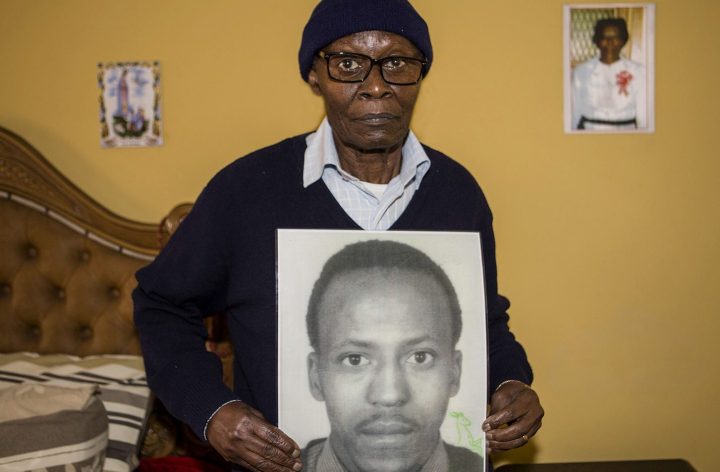LIFE ESIDIMENI INQUEST
Shivering and hungry – the last time Rev Maboe saw his son

Reverend Joseph Maboe was the first family member who spoke at the Life Esidimeni arbitration hearings. He testified that he believed the Gauteng health department was complicit in his son’s death. A member of the Life Esidimeni Family Committee, he continued to seek justice for his son’s death, but died before he could see justice done. This interview was conducted shortly before he passed away in 2021.
Reverend Joseph Maboe loved this photograph of Billy. He recalls: “He was so handsome and cheerful. When I visited, he always said, ‘Papa, you have come’, and laughed and hugged me.”
Hendrick “Billy” Ranthopi Maboe had been diagnosed with epilepsy 20 years ago and stayed at Life Esidimeni Randfontien where he received good treatment. Billy was proud that his father was a priest. “He was always saying to me, ‘Papa, you must behave very well. You must be like Bishop Tutu’,” Joseph smiles.
In May 2016, Joseph went to visit Billy at Life Esidimeni. When he arrived he saw two trucks at the gate and patients being taken away, led by nurses. “They were like ghosts or sheep going to an auction. Some were crying. Others were running helter-skelter.” Joseph asked what was happening and someone said they were going away.
Billy was still there. Joseph took him food and he was very happy. But when Joseph went back at the beginning of June, Billy was gone. The facility was under renovation and the security guard couldn’t tell him where Billy was.
A month and a half later, Joseph tracked Billy down to Bophelong Suurman in Hammanskraal, nearly two hours from where he lives. He was shocked when he saw his son.
Billy was shivering and hungry. Joseph wanted to take Billy to a hospital straight away, but the NGO said he had to wait for a doctor’s permission. Billy died six days later. “Thank God I found him and could bury him in a decent way. But the pain is still there.”
Maverick Citizen is running a series of weekly portraits of those who died in the Life Esidimeni tragedy and the stories of the loved ones left behind. Harriet Perlman, Darnell Nxumalo and photographer Mark Lewis have been interviewing families as part of an ongoing memorial and advocacy website.
The inquest into the tragedy will determine whether there can be any criminal liability for the deaths of 144 mental healthcare patients who died in the care of the South African public health system. They died from neglect, starvation, torture and abuse.
The inquest, being held via Zoom, is often mired in legal debate and technical mishaps. It can be easy to forget that people are at the heart of this horrific human tragedy.
Their lives and stories matter. The inquest is primarily about their pain, struggle for answers and the ongoing fight for justice. DM/MC
[hearken id=”daily-maverick/9226″]





















 Become an Insider
Become an Insider
These articles make me cry. How the perpetrators of this crime against humanity are still not in jail beggars belief.
Me too. So, so heartbreaking.
Travesty of justice. Glad Daily Maverick are keeping these important stories going, and paying lovely tribute to all the victims and their families.
It was one of the darkest, most inhumane moments in post 1994 SA, and yes, those culpable must be brought to book. It is entirely understandable, and right, that the initial focus should be on the people in the Gauteng DoH who were responsible for sending the already deeply troubled and often frightened psychiatric patients away from probably their one source of security and comfort in their hospital wards (without their stabilising medication or their hospital records), out into the dangerous (truly) unknown of the spurious NGOs who purported to be able to care for them. But where was the care in any of this? At the receiving end, who were the people in the NGOs who could watch fellow human beings literally dying before their eyes of dehydration, starvation and hypothermia (unbelievably traumatic ways to die), without showing even the most basic consideration, such as finding ways, even if it meant digging in their own pockets and asking others to help, to provide bread, water and blankets – and yes care? Or does this whole dreadful episode signify something about how we as a society, including some in the medical profession, or with responsibilities for healthcare, view people with mental illnesses – as somehow less than human? Has our loss of humanity gone that far? There are many questions that need to be address, both within the hearing and more broadly, within society at large.